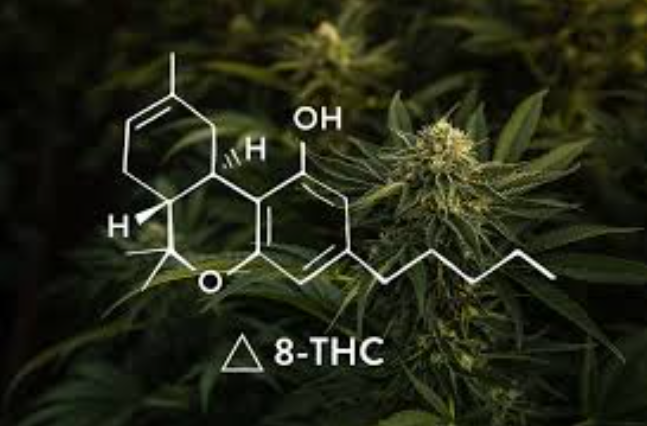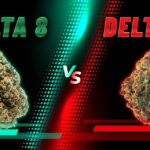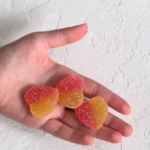Delta-8 tetrahydrocannabinol (THC) is an active ingredient (cannabinoid) produced by the cannabis plant. It’s often marketed as being a natural cannabis product, but most delta-8 THC is chemically made by adding strong acids to convert CBD oil into delta-8 THC.
Most delta-8 THC products currently being sold are manufactured without following any safety regulations. And, because delta-8 THC isn’t a main component of the cannabis plant, it hasn’t been studied as much as CBD and delta-9 THC. Currently, there are no federal regulations around childproof packaging, laboratory testing, or clear labeling of delta-8 products.
We’ll cover how delta-8 is different from delta-9 THC and CBD, its side effects, and why its safety can’t be guaranteed.
What is delta-8 THC?
Delta-8 THC is one of many chemicals produced by the cannabis plant. These chemicals interact with the human body in different ways.
But Delta-8 THC is considered a minor cannabinoid because it’s only found in very small amounts in cannabis plants. The most common and abundant chemicals in the cannabis plant are delta-9 THC and cannabidiol (CBD).
Delta-8 THC is what’s known as an isomer of delta-9 THC. This means that its chemical structure is almost identical to delta-9 — just one chemical bond is different between the two compounds. Small amounts of delta-9 THC turn into delta-8 THC naturally when the cannabis plant is exposed to light and air.
How is delta-8 made, and is it synthetic?
As we’ve mentioned, naturally occurring delta-8 THC is very rare. But, delta-8 THC can also be made chemically. The most common way to do this is by using hemp-derived CBD oil as the raw material. Strong acids are then used to convert CBD into delta-8 THC. This means that most delta-8 THC is semisynthetic, rather than the “natural” compound it often claims to be.
What does delta-8 do?
Delta-8 THC can cause a similar high to delta-9 THC. Both delta-8 and delta-9 THC produce mind-altering effects. They do this by binding to the cannabinoid receptors, which are special proteins found throughout the brain.
Does delta-8 have THC?
There’s a common misconception that delta-8 THC has less THC than delta-9 THC. But that’s not quite accurate. Technically delta-8 is THC. But, studies do suggest that it may be less potent than delta-9 THC. That’s because delta-8 THC forms weaker bonds with cannabinoid receptors in the brain than delta-9 THC. In fact, delta-8 THC is commonly referred to as “diet weed” and sold as a weaker version of delta-9 THC. Due to lack of regulation, there’s no way to be sure how much THC is in each delta-8 product.
But it is still THC. This means it’s likely to have psychoactive effects and show up on a drug test.
Is delta-8 safe?
The truth is, we don’t have enough information to know for sure. Very little human research has been done on delta-8 THC. But some laboratory and animal studies have shown that delta-8 produces similar effects to delta-9.
In healthy adults, it’s unlikely that delta-8 THC poses a serious danger if it’s produced safely and used responsibly. However, the over-the-counter (OTC) hemp market isn’t currently well regulated. So delta-8 products made from hemp CBD could be contaminated with heavy metals, pesticides, and mold — all of which could make it into your body if you consume them.
What’s even more concerning is that the chemical solvents used to convert CBD into delta-8 THC can be toxic if they aren’t removed properly from the final product (known as residual solvents). Without regulations in place to test and control for these contaminants, there’s no way to guarantee the safety of delta-8 THC products sold OTC.
That said, delta-8 THC use has risks. Between 2021 and 2024, Poison Control Centers received 8,750 calls about delta-8, and emergency room visits have increased. Experts are on the lookout for complications in minors, too. A survey of U.S. high schoolers in 2023 found that more than 11% of 12th graders report delta-8 THC use. In October 2021, the CDC and the FDA put out health warnings about the dangers of delta-8 THC.
However, some states allow the sale of delta-8 THC in licensed cannabis dispensaries after it has passed the same testing requirements as regulated cannabis products. These delta-8 products are less likely to be unsafe than their OTC counterparts
How does delta-8 compare to CBD?
Delta-8 THC has very little in common with CBD, other than the fact that CBD is used to make it. Delta-8 THC and CBD work very differently in the body. CBD doesn’t cause the same “high” that delta-8 and delta-9 THC do. But since delta-8 THC is often sold as delta-8 hemp or delta-8 CBD, this can be very confusing and misleading when you’re buying it.
What are the potential benefits of delta-8 THC?
Although there’s limited data available, delta-8 may be able to provide the same benefits as delta-9 THC but with less psychoactivity. So it may be helpful for people who want to use THC to manage nausea, pain, or insomnia but want to avoid the euphoria that comes with delta-9 THC. But more research needs to be done. And we also need better regulation to ensure that delta-8 THC products are produced safely.
Delta-8 side effects and risks
Because it’s easy to confuse delta-8 with hemp or CBD products (which typically don’t cause euphoria), many people accidentally consume too much, not expecting to get high. This may cause side effects, which can be particularly troubling if you aren’t prepared for them. Effects can include:
- Experiencing fear, anxiety, or panic
- Struggling with body coordination
- Not thinking clearly
- Seeing or hearing things that aren’t really there
- Having irrational thoughts or feeling like you’re not yourself
If you do decide to try delta-8 THC, it’s best to start with a small dose to see how it will affect you. Increase your dose slowly over time to allow your body to adjust and avoid negative side effects. Don’t drive or operate machinery on delta-8. Keep in mind, these products are not appropriate for children or adolescents.
What to do if you have severe side effects from delta-8 THC
If you experience any of the symptoms listed above, rest assured that they’re usually temporary. Keep in mind that if you’ve accidentally taken too much delta-8 THC in edible form, it could take several hours to feel normal again. It’s best to stay calm and use self-care techniques while you wait for the effects to wear off.
However, if you’re having difficulty breathing, chest pain, or any other serious concerns, it’s important to call 911 or go to the emergency room. Other serious side effects could be due to residual solvents or contamination.
How much delta-8 is safe to consume?
If it isn’t from a regulated dispensary, there’s no safe amount of delta-8 to consume. But more research is needed to understand what a standard dose of even regulated delta-8 products should be.
Because the widespread use of delta-8 is so new, it’s too soon to know how addictive it is. However, given its similar effects with delta-9 THC and the way it interacts with the brain, it’s very likely that delta-8 carries all the same risks as cannabis use, including the risk for dependence and addiction.
Similar to cannabis, there are some serious risks of delta-8 THC use in some specific populations, including:
- Teenagers
- People who are pregnant or breastfeeding
- People with serious mental health concerns
- People with underlying heart conditions
It’s best to avoid delta-8 THC altogether if you fall into one of these groups.
Is delta-8 THC legal?
In short, it’s complicated. In 2018, Congress passed the farm bill, which legalized chemicals derived from hemp. So, as long as a delta-8 product uses hemp-derived CBD as the raw material, it’s technically federally legal.
But most people see this as a “loophole” that uses the farm bill in ways it wasn’t intended. The surge in delta-8 THC production seems to be a way for hemp CBD companies to sell an OTC hemp-based product that makes people feel “high.” Without safety measures in place, it’s also putting people at risk.
In response, several states have banned the sale of delta-8 THC products, citing concerns over public health and safety.
How do you know if you’ve bought delta-8 THC?
Delta-8 products are most commonly sold online, in tobacco shops, and in states where cannabis is illegal. You can find it in vape cartridges, edibles, and capsules, as well as tinctures. Delta-8 oil can even be sprayed on a hemp CBD flower.
The packaging and labeling of delta-8 products can be very confusing and misleading. If you see a product being sold as any of the following, you’re probably looking at a delta-8 THC product:
- Diet weed
- Light cannabis
- Delta-8 hemp
- Delta-8 CBD
- Something that gives a “legal high”


